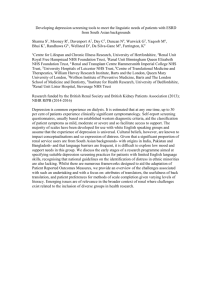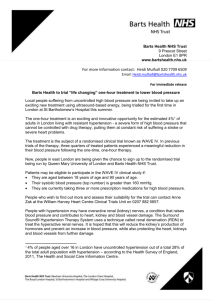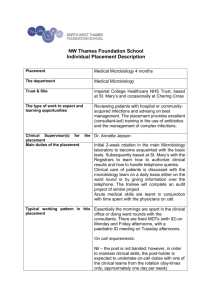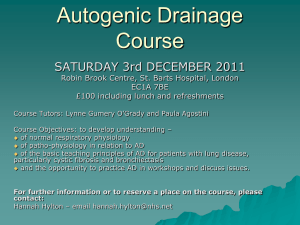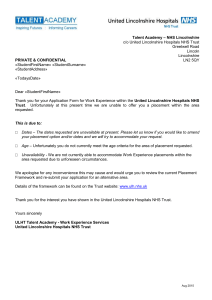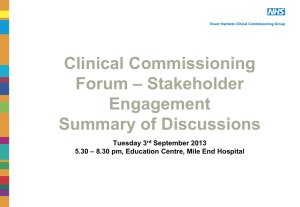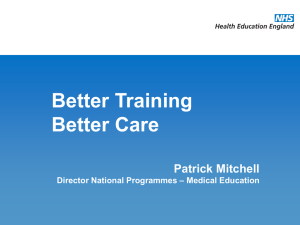Academic FP 2016 JDs
advertisement
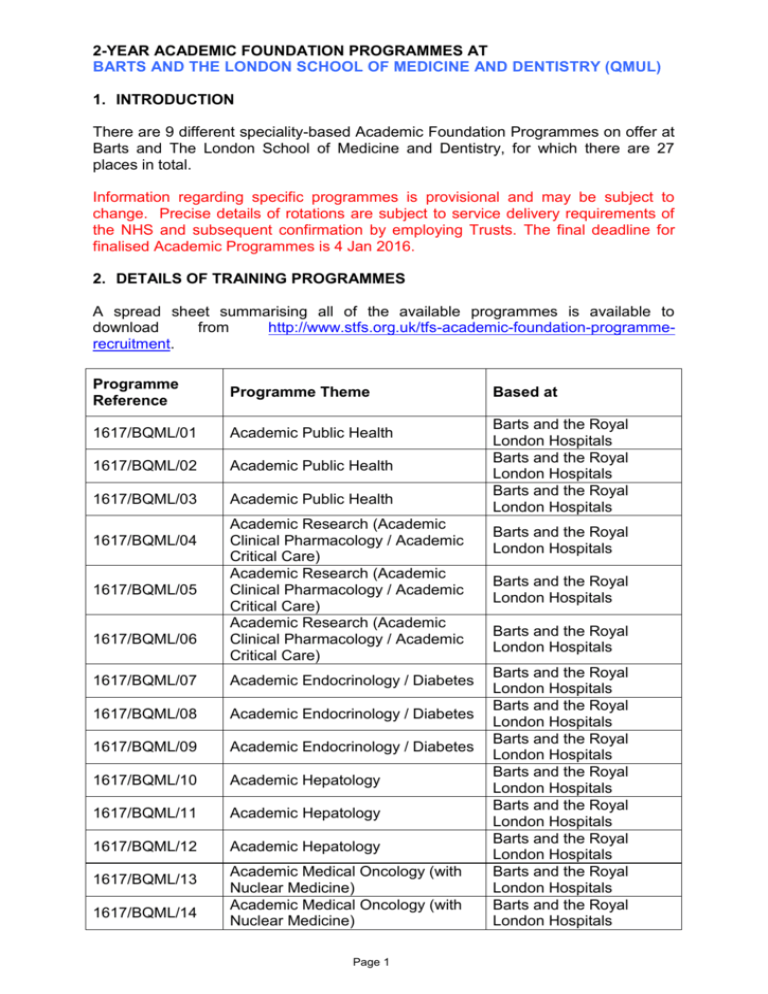
2-YEAR ACADEMIC FOUNDATION PROGRAMMES AT BARTS AND THE LONDON SCHOOL OF MEDICINE AND DENTISTRY (QMUL) 1. INTRODUCTION There are 9 different speciality-based Academic Foundation Programmes on offer at Barts and The London School of Medicine and Dentistry, for which there are 27 places in total. Information regarding specific programmes is provisional and may be subject to change. Precise details of rotations are subject to service delivery requirements of the NHS and subsequent confirmation by employing Trusts. The final deadline for finalised Academic Programmes is 4 Jan 2016. 2. DETAILS OF TRAINING PROGRAMMES A spread sheet summarising all of the available programmes is available to download from http://www.stfs.org.uk/tfs-academic-foundation-programmerecruitment. Programme Reference Programme Theme 1617/BQML/01 Academic Public Health 1617/BQML/02 Academic Public Health 1617/BQML/03 Academic Public Health 1617/BQML/04 1617/BQML/05 1617/BQML/06 Academic Research (Academic Clinical Pharmacology / Academic Critical Care) Academic Research (Academic Clinical Pharmacology / Academic Critical Care) Academic Research (Academic Clinical Pharmacology / Academic Critical Care) 1617/BQML/07 Academic Endocrinology / Diabetes 1617/BQML/08 Academic Endocrinology / Diabetes 1617/BQML/09 Academic Endocrinology / Diabetes 1617/BQML/10 Academic Hepatology 1617/BQML/11 Academic Hepatology 1617/BQML/12 Academic Hepatology 1617/BQML/13 1617/BQML/14 Academic Medical Oncology (with Nuclear Medicine) Academic Medical Oncology (with Nuclear Medicine) Page 1 Based at Barts and the Royal London Hospitals Barts and the Royal London Hospitals Barts and the Royal London Hospitals Barts and the Royal London Hospitals Barts and the Royal London Hospitals Barts and the Royal London Hospitals Barts and the Royal London Hospitals Barts and the Royal London Hospitals Barts and the Royal London Hospitals Barts and the Royal London Hospitals Barts and the Royal London Hospitals Barts and the Royal London Hospitals Barts and the Royal London Hospitals Barts and the Royal London Hospitals 1617/BQML/15 Academic Medical Oncology (with Nuclear Medicine) Barts and the Royal London Hospitals Barts and the Royal London Hospitals Barts and the Royal London Hospitals Barts and the Royal London Hospitals Barts and the Royal London Hospitals Barts and the Royal London Hospitals Barts and the Royal London Hospitals Barts and the Royal London Hospitals Barts and the Royal London Hospitals Barts and the Royal London Hospitals 1617/BQML/16 Academic Neurology 1617/BQML/17 Academic Neurology 1617/BQML/18 Academic Neurology 1617/BQML/19 Academic Psychiatry 1617/BQML/20 Academic Psychiatry 1617/BQML/21 Academic Psychiatry 1617/BQML/22 Academic General Practice 1617/BQML/23 Academic General Practice 1617/BQML/24 Academic General Practice 1617/BQML/25 Academic Medical Education Whipps Cross Hospital 1617/BQML/26 Academic Medical Education Whipps Cross Hospital 1617/BQML/27 Academic Medical Education Whipps Cross Hospital Information can also be found at www.netfs.org.uk The Academic Foundation Programmes are based at Barts Health NHS Trust (Newham and Whipps Cross Hospitals), Barking Havering and Redbridge University Hospitals NHS Trust (Queens Hospital), or Homerton University Hospital NHS Foundation Trust for the F1 year, where you will learn basic medical and surgical skills in a busy hospital, and acquire the necessary clinical competences. The second year (F2) offers 9 posts with an academic link. These comprise 8 posts at Barts and The Royal London site, each containing an opportunity to complete a formal research project, and 1 post at the Whipps Cross site offering training in medical education. Page 2 Programme 1 – Academic Public Health (with Health Informatics at Farr Institute) Reference: 1617/BQML/01 Reference: 1617/BQML/02 Reference: 1617/BQML/03 Individual Placement Descriptor (IPD) for the four month academic placement Separate IPDs for clinical placements are available on foundation school websites Type of programme Academic Public Health Employing trust: Academic placement based at: Barts Health NHS Trust Mile End Hospital, Bancroft Road E1 Brief outline of department Trainees will work within Tower Hamlets CCG based at Mile End Hospital, Bancroft Road, E1 4DG Structure of academic project/what expected Trainees will work within Tower Hamlets Primary Care Trust based at Mile End Hospital, Bancroft Road, E1. The attachment will comprise practical aspects of public health such as disease outbreak management, reducing health risk and the role of public health within the community. Direct experience will be provided in one or more of the following areas: An assessment of an aspect of preventable mortality, and recommendations for clinical and cost-effective interventions to reduce this. An evaluation of a local screening programme, e.g. cancer screening, antenatal screening, or screening for risk of diabetes, heart disease. The management of an outbreak of communicable disease, e.g. meningitis, food poisoning, or drug resistant TB The development of clinical governance including clinical audit, clinical effectiveness, and the management of serious untoward incidents. An equal audit - an evaluation of the extent to which a set of local services focus on those with greatest needs. Trainees will also be taught management skills including presenting data and evidence, handling meetings, and persuading and motivating colleagues. A choice of research project will be provided. This will comprise evidence collection, data analysis and presentation, and networking with local stakeholders. It is expected that a written report will be produced with a view to subsequent publication. Page 3 There will be an opportunity to study and research in Medical Informatics with the Director, Professor Harry Hemingway, UCL, h.hemingway@ucl.ac.uk at the Farr Institute (UCL) and the Deputy Director of LSHTM (Professor Liam Smeeth, liam.smeeth@lshtm.ac.uk) The Farr Institute of Health Informatics Research, London is a collaboration between the Higher Education Institutions of UCL, the London School of Hygiene and Tropical Medicine and Queen Mary University of London, and the National Health Service organisations in UCLPartners and Public Health England. The Institute brings together researchers and clinicians to establish a centre of excellence in innovative health informatics research to maximise translational impact from discovery through trials to clinical practice, service delivery, patient outcomes and public health. The successful applicants will have the opportunity to work with world leading experts and gain experience in the use of applied informatics in medical research. There will be the potential to participate in a research project leading to a journal publication. Clinical commitments during academic placement Working Day Monday – Friday 9am – 5pm The attachment will comprise practical aspects of public health such as disease outbreak management, reducing health risk and the role of public health within the community. The doctor will be responsible for other specific clinical duties as allocated by consultants including performing other duties in occasional emergencies and unforeseen circumstances. Departmental academic teaching programme Trainees will be taught management skills including presenting data and evidence, handling meetings, and persuading and motivating colleagues. Trainees are expected to attend the structured teaching programmes provided by the department and the F2 generic teaching programme (1 day per month) as well as presenting research at academic F2 evenings (2 per year, March and June). A program of training lectures and courses will be provided and will include training in research ethics, good research practice, grant applications and scientific writing as well as relevant training in clinical medicine and career development. Academic Lead Dr Somen Banerjee - Associate Director of Public Health somen.banerjee@towerhamlets.gov.uk Page 4 Programme 2 – Academic Research (Academic Clinical Pharmacology / Academic Critical Care) Reference: 1617/BQML/04 Reference: 1617/BQML/05 Reference: 1617/BQML/06 Individual Placement Descriptor (IPD) for the four month academic placement Separate IPDs for clinical placements are available on foundation school websites Type of programme Successful applicants will be able to choose between the following two Academic specialties depending on their interests and following discussions with Academic Programme Leads: Academic Clinical Pharmacology OR Academic Critical Care Employing Trust: Academic placement based at: Barts Health NHS Trust Barts and the Royal London Hospitals Brief outline of department Academic Clinical Pharmacology This post is based in the Clinical Trials Unit and the Department of Clinical Pharmacology at Barts and The London, Charterhouse Square campus, London EC1M Academic Critical Care The 44 bed critical care unit at the Royal London currently comprises 17 consultants with research interests in haemodynamics, immune dysfunction of critical illness, genomics, acute kidney injury and perioperative medicine. Structure of academic project/what expected Academic Clinical Pharmacology This academic F2 post provides research, teaching and clinical experience, the balance depending on the individual needs and aspirations of the trainee and on opportunities available when the trainee is on attachment. The F2 will be trained in the theoretical and practical aspects of clinical trials. Activities will include the planning of studies, through regulatory and governance issues, to recruitment and then the day-to-day care of patients within the setting of a range of clinical trials in phases 2-4. The programme will also embrace training in advanced practical methods in pharmacology/physiology such as intra-arterial infusion of drugs, arterial tonometry, and the measurement of baroreceptor reflexes (both of the latter predict cardiac outcome). Our team is multi-disciplinary, including research fellows, sister-grade nurses, administrative and technical staff. Academic Critical Care This academic F2 post provides a mixture of research and clinical experience, the balance depending on the individual needs and aspirations of the trainee, but will Page 5 provide the trainee with the knowledge, skills and attitudes to reach the expected level of competency for an F2. Clinical commitments during academic placement Academic Clinical Pharmacology The trainee will attend a weekly Hypertension clinic at St Bartholomew's Hospital. This is a tertiary referral service and provides an excellent opportunity to develop experience in the investigation and management of complex essential and secondary hypertension. Academic Critical Care The placement is primarily based on the critical care unit at the Royal London Hospital but opportunities are available to spend time at other critical care units within the Trust. These arrangements are flexible and will be agreed between trainee and supervisor to give the trainee the best choice of clinical and research experience whilst facilitating their chosen research project. Departmental academic teaching programme Academic Clinical Pharmacology Trainees are expected to attend the structured teaching programmes provided by the department and the F2 generic teaching programme (1 day per month) as well as presenting research at academic F2 evenings (2 per year March and June). Training lectures and courses will be provided and will include training in research ethics, good research practice, grant applications and scientific writing as well as relevant training in clinical medicine and career development. Clinical Pharmacology and Therapeutics MBBS teaching programme The Department has major input to the MBBS programme. The trainee will participate in Problem Based Learning with Year 1 and/or 2 students, Clinical Pharmacology and Therapeutics (CPT) teaching during Years 3-5, on-line supervision of CPT student training modules, exam question writing, and student examinations. Activities depend on the time of year that the trainee is working in CPT and a separate outline is provided on arrival. Academic Critical Care Trainees will attend the structured teaching programmes provided by the department and the F2 generic teaching programme (1 day per month) as well as presenting research at academic F2 evenings (2 per year March and June). A program of training lectures and courses will be provided and will include training in research ethics, good research practice, grant applications and scientific writing as well as relevant training in clinical medicine and career development. Academic Leads Academic Clinical Pharmacology Dr Patricia McGettigan - Consultant Clinical Pharmacology p.mcgettigan@qmul.ac.uk Academic Critical Care Prof Rupert Pearse - Consultant and Professor of Intensive Care Medicine r.pearse@qmul.ac.uk Page 6 Programme 3 – Academic Endocrinology or Diabetes Reference: 1617/BQML/07 Reference: 1617/BQML/08 Reference: 1617/BQML/09 Individual Placement Descriptor (IPD) for the four month academic placement Separate IPDs for clinical placements are available on foundation school websites Type of programme Successful applicants will be able to choose between the following two Academic specialties (or a combination of both) depending on their interests and following discussions with Academic Programme Leads: Academic Endocrinology AND/OR Academic Diabetes Employing trust: Academic placement based at: Barts Health NHS Trust Barts and the Royal London Hospitals Brief outline of department Academic Endocrinology The Department of Endocrinology is a component of Barts and the London, Queen Mary, University of London, and is based at St Bartholomew's Hospital. The Department has a national and international reputation as a leading centre in both clinical and basic endocrine research, and is renowned for its record in all areas of clinical and experimental endocrinology. The Endocrine Unit deals with a diverse range of endocrine disorders, there is a particular interest in neuroendocrinology (pituitary tumours, prolactinomas, acromegaly, Cushing's disease, craniopharyngiomas etc), neuroendocrine tumours such as phaeochromocytomas and carcinoids, and genetic endocrine disorders. www.bartsendocrinology.co.uk Academic Diabetes The metabolic medicine firms at the Royal London share ward 11C. There are 8 consultants including 3 Clinical Academics who are part of Barts and the London, Queen Mary, University of London and all are active in Research and Teaching. Diabetes is one of the busiest clinical medicine disciplines and our previous Academic F2 have enjoyed especial success with their academic projects. Structure of academic project/what expected Academic Endocrinology www.whri.qmul.ac.uk/research/endocrinology Academic Diabetes This academic F2 post provides a mixture of research and clinical experience, the balance depending on the individual needs and aspirations of the trainee. Clinical experience will comprise general internal medicine with a focus on the management of diabetes, morbid obesity and hyperlipidaemia. The post holder will again be able to acquire many of the practical skills and competencies needed for Page 7 the Foundation Programme. Additional opportunities include working with a computerised patient record/care system and undertaking a clinical audit. The F2 post will give opportunities for practical experience in teaching in a variety of settings including supervising PBLs and small-group tutorials, formal teaching in theories of adult learning and of teaching methods including the Teaching the Teachers to Teach scheme, and training as a Personal Tutor, experience in communication skills, and/or research in teaching methodology. A wide variety of research projects is available, including studies based upon small series of patients, case reports, participation in clinical physiology studies and laboratory-based projects. Departmental research interests currently include genetics of Type 2 diabetes, immunology of Type 1 diabetes, obesity, adipose tissue physiology, nutrition and prevention of Type 2 diabetes. A recurrent theme is care of ethnic minorities at high-risk of diabetes and vascular disease. Postholders will receive training in scientific method, in grant applications and research-funding, in career planning, ethics of medical research, and statistical methods relevant to their research. Some may undertake a systematic review, analyse existing data or do pilot work for a future study. Participation in research projects will usually be based on the intention to publish e.g. as the first author of a case report or as a co-author on a multi-author laboratory-based project. The composition of the post can be adapted to include different emphases on teaching/learning and research, and can be interfaced with other specialties. The learning needs of the individual post holder will be agreed at the start of the post. Clinical commitments during academic placement Academic Endocrinology Working Day Monday – Friday 9am – 5pm The F2 doctor is responsible with other staff for the ward care of patients and the maintenance of the patient’s medical record. Academic Diabetes Working Day Monday – Friday 9am – 5pm The F2 doctor is responsible with other staff for the ward care of patients and the maintenance of the patient’s medical record. Departmental academic teaching programme Academic Endocrinology The department has an Endocrine Club Seminar, Clinical Journal Club or Clinical Audit and Research meeting every Monday. Trainees are expected to attend the structured teaching programmes provided by the department and the F2 generic teaching programme (1 day per month) as well as presenting research at academic F2 evenings (2 per year March and June). A program of training lectures and courses will be provided and will include training in research ethics, good research practice, grant applications and scientific writing as well as relevant training in clinical medicine and career development. Page 8 Academic Diabetes Trainees are expected to attend the structured teaching programmes provided by the department and the F2 generic teaching programme (1 day per month) as well as presenting research at academic F2 evenings (2 per year March and June). A program of training lectures and courses will be provided and will include training in research ethics, good research practice, grant applications and scientific writing as well as relevant training in clinical medicine and career development. Academic Lead Academic Endocrinology Professor Will Drake - Consultant Endocrinologist w.m.drake@qmul.ac.uk Academic Diabetes Dr Simon Coppack - Consultant Physician s.w.coppack@qmul.ac.uk Page 9 Programme 4 – Academic Hepatology Reference: 1617/BQML/10 Reference: 1617/BQML/11 Reference: 1617/BQML/12 Individual Placement Descriptor (IPD) for the four month academic placement Separate IPDs for clinical placements are available on foundation school websites Type of programme Academic Hepatology Employing trust: Academic placement based at: Barts Health NHS Trust Barts and the Royal London Hospitals Brief outline of department The Liver Unit is part of The Blizard Institute and consists of over 20 basic and clinical scientists, doctors and nurses. The Liver Unit has an interest in all aspects of liver disease with programs of research examining inflammatory liver disease, fat induced liver injury and viral hepatitis. The unit is an international centre of excellence for the management of patients with viral hepatitis and runs a large number of clinical trials as well as conducting studies in clinical service delivery and molecular virology. Given that over 600 million people worldwide are infected with either hepatitis B or hepatitis C the unit has a long-standing interest in working in the global community and we run an active clinical program in Zambia with plans for studies in Pakistan. The Liver Unit works closely with the departments of Immunology, Paediatrics and Virology and has links to other liver centres in London, including an active transplantation program with The Royal Free Hospital. Structure of academic project/what expected The post holder will join one of the clinical/academic groups and will choose an appropriate programme based on current interests. He/she will spend two full days per week developing a research project under the supervision of one of the senior academics. Clinical commitments during academic placement During the remainder of the week the post holder will work with the clinical team and assist in the management of patients with conditions relevant to the on-going research project. Departmental academic teaching programme Trainees are expected to attend the structured teaching programmes provided by the department and the F2 generic teaching programme (1 day per month) as well as presenting research at academic F2 evenings (2 per year March and June). A program of training lectures and courses will be provided and will include training in research ethics, good research practice, grant applications and scientific writing as well as relevant training in clinical medicine and career development. Academic Lead Professor Graham Foster g.r.foster@qmul.ac.uk Page 10 Programme 5 – Academic Medical Oncology (with Nuclear Medicine) Reference: 1617/BQML/13 Reference: 1617/BQML/14 Reference: 1617/BQML/15 Individual Placement Descriptor (IPD) for the four month academic placement Separate IPDs for clinical placements are available on foundation school websites Type of programme Academic Medical Oncology (with Nuclear Medicine) Employing trust: Academic placement based at: Barts Health NHS Trust Barts and the Royal London Hospitals Brief outline of department Ward 5B St Bartholomews Hospital and the Centre for Molecular Oncology in Barts Cancer Institute at Charterhouse Square (www.bci.qmul.ac.uk) The Dept comprises 20 Consultants all with academic appointments providing care for all solid tumour malignancies including bone marrow transplantation. In Oncology, particular emphasis is placed upon good symptom control in patients with advanced disease, especially pain control. Additionally, trainees will learn about the management of oncological emergencies, such as spinal cord compression and hypercalcaemia, and how to recognise and manage of the complications of cancer treatment, such as mucositis and neutropaenic fever. Nuclear Medicine is based in PET Imaging Centre, St. Bartholomew’s Hospital. The department comprises consultants with research interests in nuclear imaging specifically PET/CT imaging. Structure of academic project/what expected In conjunction with the attachment to Nuclear Medicine, trainees will be encouraged to participate in ongoing research projects, specifically related to PET/CT imaging will be strongly encouraged. The PET Centre is exploring novel molecular imaging strategies from the preclinical development to the clinical evaluation specifically related to novel treatments such as gene therapy. Trainees will be involved in data collection and analysis within these trials. Clinical commitments during academic placement Working Day Monday – Friday 9am – 5pm The post will embrace inpatient care of patients with a wide range of solid malignancies as well as exposure to translational research in Medical Oncology. Multidisciplinary team working is of particular importance in Medical Oncology and trainees will be expected to appreciate the need for advice from other specialities, especially Palliative Care, Radiotherapy and Surgery. Expert knowledge of and prescribing of chemotherapy is not expected at F2 level. Page 11 The Nuclear Medicine training embraces the most relevant clinical, pathophysiological and scientific aspects of the specialty. Particular emphasis is placed on diagnostic and therapeutic procedures in oncology, cardiology and endocrinology. The candidate will experience the whole process from dispensing radiopharmaceuticals to obtaining, viewing and reporting of scintigraphic imaging in their clinical and radiological context. The training will specifically focus on the performance and interpretation of PET and PET/CT imaging. The trainees will have the opportunity to develop expertise in clinical indications for PET imaging, normal distribution of clinically used PET tracers, potential pitfalls, and knowledge of abnormal findings and identification of the corresponding anatomical correlate. Departmental academic teaching programme Trainees are expected to attend the structured teaching programmes provided by the department and the F2 generic teaching programme (1 day per month) as well as presenting research at academic F2 evenings (2 per year March and June). A program of training lectures and courses will be provided and will include training in research ethics, good research practice, grant applications and scientific writing as well as relevant training in clinical medicine and career development. Academic Leads Prof Thorsten Hagemann (Interim) t.hagemann@qmul.ac.uk Dr Michelle Lockley michelle.lockley@bartshealth.nhs.uk Dr Hikmat Jan (until end 2016) Consultant Nuclear Medicine hikmat.jan@bartshealth.nhs.uk Dr Ewa Nowosinska Consultant Nuclear Medicine Ewa.Nowosinska@bartshealth.nhs.uk Page 12 Programme 6 – Academic Neurology Reference: 1617/BQML/16 Reference: 1617/BQML/17 Reference: 1617/BQML/18 Individual Placement Descriptor (IPD) for the four month academic placement Separate IPDs for clinical placements are available on foundation school websites Type of programme Academic Neurology Employing trust: Academic placement based at: Barts Health NHS Trust Barts and the Royal London Hospitals Brief outline of department There are 16 consultant neurologists of which 3 are based primarily at Whipps Cross Hospital and 1 at Newham. There are 10-15 dedicated neurology beds on the new neuroscience unit and 3 video-EEG telemetry beds. The adult intensive care unit deals with many neuroemergency cases per year and there are dedicated operating theatres as part of the main theatre suite. There is also a 12 bedded hyperacute stroke unit plus a 14bedded stroke unit situated on the third floor. Sub-specialisation within the department includes epilepsy, stroke, movement disorders, headache, multiple sclerosis, neuro-rehabilitation and neuromuscular/peripheral nerve/MND. Structure of academic project/what expected Headed by Professor Gavin Giovannoni, the internationally recognised Centre for Neuroscience and Trauma has approximately 85 research active staff and PhD students. The Centre’s strategic research is focused on five broad themes: trauma sciences, neurotrauma and neurodegenerative disorders, neuroimmunology, stem cells, regeneration and cancer and genomics and cancer. The Centre’s themes have been mapped onto clinical academic units within Barts Health NHS Trust with many of its staff actively involved in clinical research, including phase 2 and 3 clinical trials. The research themes have been created with the specific aim of creating partnerships between basic scientists and clinicians to encourage translational research. Page 13 Clinical commitments during academic placement Typical work pattern will depend on the Departmental timetable and will need to be flexible for training purposes; for example on a Thursday the trainee will be expected to attend the neuro-radiology round that starts at 8am. Departmental academic teaching programme Trainees are expected to attend the structured teaching programmes provided by the department and the F2 generic teaching programme (1 day per month) as well as presenting research at academic F2 evenings (2 per year March and June). A program of training lectures and courses will be provided and will include training in research ethics, good research practice, grant applications and scientific writing as well as relevant training in clinical medicine and career development. Academic Lead Professor Gavin Giovannoni - Academic Lead g.giovannoni@qmul.ac.uk Dr Afraim Salek-Haddadi - Service Lead afraim.salek-haddadi@bartshealth.nhs.uk Page 14 Programme 7 – Academic Psychiatry Reference: 1617/BQML/19 Reference: 1617/BQML/20 Reference: 1617/BQML/21 Individual Placement Descriptor (IPD) for the four month academic placement Separate IPDs for clinical placements are available on foundation school websites Type of programme Academic Psychiatry Employing trust: Academic placement based at: Barts Health NHS Trust Barts and the Royal London Hospitals and Charterhouse Square Brief outline of department The Department includes six professors. Our research interests include epidemiological psychiatry with a focus on environmental and cultural influences on mental health. We also focus on liaison psychiatry and mind-body medicine, particularly in the study and treatment of chronic fatigue syndrome, chronic pain disorders, and psycho-oncology. There is scope for forensic psychiatry and social and community psychiatry research also. The placement is based either in the Centre for Psychiatry, Charterhouse Square or at St Bartholomew’s hospital. Structure of academic project/what expected This academic F2 post provides a mixture of research and clinical experience, the balance depending on the individual needs and aspirations of the trainee. Trainees who wish to focus on research would be particularly welcome. Recent trainees have undertaken and published systematic reviews of cytokines in CFS as well as primary data papers, using already collected data, such as objective sleep patterns in CFS and defining heterogeneity of CFS. Skills learnt have included study design, statistical analysis (e.g. systematic review methods, factor and latent class analyses) and writing for publication. Some examples of existing projects that you may join include the following: PACE trial: secondary analysis papers from this trial of non-pharmacological interventions for CFS (n = 641). GETSET trial: secondary analysis papers from this trial of self-help management based on exercise therapy for CFS. Improving quality of life of cancer survivors: A programme (SURECAN) of research developing an integrated, multi-component therapy, including CBT, exercise therapy and vocational rehabilitation components for patients with various cancers. Psychosocial factors associated with impact of cancer in long-term survivors and their families. Continuing research on the Bart’s cohort of long-term haematological and maxilla-facial cancer survivors and their families and development of web-based Page 15 resources to improve their well-being and quality of life. Improving outcome for young victims of violence attending trauma centres: this seeks to identify risk and protective factors for adverse mental health outcomes and involvement in future violence of people injured through violence. This will particularly focus on addressing the increasing numbers of young people injured through knife and gunshot crime and the role of gang violence. Environmental and Cultural Psychiatry Research opportunities are available in environmental and cultural psychiatry including studies of adolescent mental health in relation to the regeneration around the 2012 Olympic Games and studies of the impact of transport noise on children’s cognitive functioning and health. Research on work and health include MRC funded analysis of cohort studies of life-course factors influencing extending working lives and studies of interventions with managers on reducing employee stress in the workplace. Further studies include analysis of life-course influences on adult common mental disorders. Cultural research includes the place migration, trauma, identity and discrimination, amongst other social and life events for risks of mental disorders. Suicide and self-harm prevention, and extremism and homicide. Tackling inequalities and public mental health interventions, You will have opportunities to undertake systematic reviews, trials, or observational cohort data analyses. Clinical commitments during academic placement Typically, the hours are office based. The majority of the placement will involve research work, although trainees are encouraged to continue with some relevant clinical interests that may involve attendance at regular clinics. Departmental academic teaching programme Trainees are expected to attend the structured teaching programmes provided by the department and the F2 generic teaching programme (1 day per month) as well as presenting research at academic F2 evenings (2 per year March and June). A program of training lectures and courses will be provided and will include training in research ethics, good research practice, grant applications and scientific writing as well as relevant training in clinical medicine and career development. Academic Leads Professor Kamaldeep Bhui, k.s.bhui@qmul.ac.uk Professor Ania Korszun, a.korszun@qmul.ac.uk Professor Stephen Stansfeld, s.a.stansfeld@qmul.ac.uk Professor Peter White, p.d.white@qmul.ac.uk Page 16 Programme 8 – Academic General Practice Reference: 1617/BQML/22 Reference: 1617/BQML/23 Reference: 1617/BQML/24 Individual Placement Descriptor (IPD) for the four month academic placement Separate IPDs for clinical placements are available on foundation school websites Type of programme Academic General Practice Employing trust: Academic placement based at: Barts Health NHS Trust Barts and the Royal London Hospitals Brief outline of department The placement will be located at: Blithehale Medical Centre, 10-22 Dunbridge Street, London E2 6JA Structure of academic project/what expected This academic F2 post provides a mixture of research and clinical experience, the balance depending on the individual needs and aspirations of the trainee. It gives the trainee the opportunity to work with one of our well established research groups (cardiovascular disease, diabetes, domestic violence, locomoter disease, respiratory disease) alongside an experienced researcher on a small research project. Typically this will be a systematic review, a secondary analysis of an existing data set, or helping the research group to develop a research proposal. There will also be an opportunity to gain training and experience in undergraduate teaching. Clinical commitments during academic placement Working Day Monday – Friday 9am – 5pm The trainee will be required to work 2-3 days per week in the clinic setting and use the remainder of the week for research. The clinical opportunities will provide the trainee with the knowledge, skills and attitudes to meet the competencies of an F2 doctor. Departmental academic teaching programme There will be a half day release throughout the year for formal academic training and development in general practice and public health. Trainees are expected to attend the structured teaching programmes provided by the department and the F2 generic teaching programme (1 day per month) as well as presenting research at academic F2 evenings (2 per year March and June). A program of training lectures and courses will be provided and will include training Page 17 in research ethics, good research practice, grant applications and scientific writing as well as relevant training in clinical medicine and career development. Academic Lead Professor Trisha Greenhalgh - Academic Lead Primary Health Care p.greenhalgh@qmul.ac.uk Dr Simon Brownleader - GP Academic Supervisor sbrownleader@nhs.net Page 18 Programme 9 – Academic Medical Education in both Respiratory and Psychiatry Specialties Reference: 1617/BQML/25 Reference: 1617/BQML/26 Reference: 1617/BQML/27 Individual Placement Descriptor (IPD) for the four month academic placement Separate IPDs for clinical placements are available on foundation school websites Type of programme Academic Medical Education (Respiratory Medicine) Employing trust: Academic placement based at: Barts Health NHS Trust Whipps Cross Hospital Brief outline of department This F2 post will form part of the Chest Team, consisting of 5 Consultants, 3 Specialist Registrars, 1 ST1, 1 ST2, 1 F2 and 6 F1s. The respiratory department has responsibility for 2 of the dedicated medical wards, and outpatient activity is centred in a purpose built Chest Clinic within the hospital grounds. Structure of academic project/what expected Trainees are expected to enrol on and successfully complete the postgraduate Certificate in Teaching and Learning (CILT) programme offered by Queen Mary University of London. Academic release will be provided accordingly. Completion of the CILT curriculum requires the participant to engage in observed teaching activities within the Trust. In addition, collaborative project work is encouraged and a number of trainees have presented their work at ASME and AMEE national conferences. Projects can involve any aspect of medical education and are supervised by Dr Simon Quantrill and Prof Mike Roberts. Clinical commitments during academic placement This post will provide experience in Acute Respiratory and General Medicine, with responsibility for managing a wide variety of cases. The post holder will be expected to take part in a general medical on call rota. Departmental academic teaching programme The trainee will be expected to attend weekly departmental educational x-ray and clinical meetings as well as weekly generic F2 teaching sessions. Academic day release to complete the CILT programme will be provided for this part of the rotation. Academic Lead: Dr Simon Quantrill Simon.quantrill@bartshealth.nhs.uk Type of programme Page 19 Academic Medical Education (Community Psychiatry) Brief outline of department This F2 post is in community psychiatry, based in the Community Recovery Team, Waltham Forest, under the supervision of Dr Jacob Lawrence, consultant psychiatrist. This service is run by the North East London NHS Foundation Trust, Waltham Forest Directorate. The post is based in the Larkswood Centre, Thorpe Coombe Hospital, 712, Forest Road, Walthamstow, London E17 3HP. There are 2 other consultant psychiatrists, 2 core psychiatry / GPVTS trainees, an ST4-6 doctor, 1 Specialty Doctor and 1 Associate Specialist. There is also a large multidisciplinary team and colleagues providing administrative and secretarial support. Structure of academic project/what expected To be discussed and agreed with Dr Jacob Lawrence in keeping with the expectations of the Academic Foundation Programme and local opportunities. Clinical commitments during academic placement You will be involved in the assessment and review of patients with long term psychiatric conditions such as schizophrenia and bipolar affective disorder whose needs require the allocation of a care coordinator (nurse, social worker, OT) and the provision of a formal care plan under the terms of the Care Programme Approach (CPA). You will gain extensive experience, supervision and training in the assessment and treatment of such patients; mental state examination; diagnosis; risk assessment and management; team working; interagency working; use of the Mental Health Act; psychopharmacology; the importance of physical health screening and care; and the role of psychological therapy. You will be shown how good quality care encompasses medical, social and psychological dimensions Departmental academic teaching programme Academic day release will be provided for this part of the rotation to complete the CILT programme. Release will also be given for the generic local academic programme which is held on Wednesday afternoons at the Thorpe Coombe site, Goodmayes Hospital or St Bartholomew’s Hospital. Academic Lead Dr Jacob Lawrence Jacob.Lawrence@nelft.nhs.uk Page 20 THE MEDICAL SCHOOL AND PARTNER TRUSTS Barts and the London School of Medicine and Dentistry Barts and The London offers international levels of excellence in research and teaching while serving a population of unrivalled diversity. Through partnership with our linked trusts - Barts Health NHS Trust, and our associated University Hospital Trusts (Homerton and Queen’s) the School’s research and teaching is informed by an exceptionally wide ranging and stimulating clinical environment. At the heart of the School’s mission lies world class research, the result of a focused programme of recruitment of leading research groups from the UK and abroad and a £100 million investment in state-of-the-art facilities within Queen Mary University. Research is focused on translational research, cancer, cardiac, dentistry, inflammation, endocrinology/ metabolism, immunology and infectious diseases, genomics, neuroscience, gastroenterology, epidemiology and primary care. The School is nationally and internationally recognised for research in these areas, reflected in the £40 million it attracts annually in research income. Its fundamental mission, with its partner NHS Trusts, and other partner organisations, such as CRUK, is to ensure that that the best possible clinical service is underpinned by the very latest developments in scientific and clinical teaching, training and research. The School is organised into the following Institutes: Barts Cancer Institute Blizard Institute of Cell and Molecular Science Institute of Health Sciences Education Institute of Dentistry William Harvey Research Institute Wolfson Institute of Preventive Medicine The School is also home to the first Cancer Research UK Clinical Centre to be established which takes an innovative 'molecules to patient' approach to research. Barts Health NHS Trust Barts Health NHS Trust was created on 1 April 2012 following the approved merger of Barts and The London NHS Trust, Newham University Hospital NHS Trust and Whipps Cross University Hospital NHS Trust. It is one of the biggest and busiest NHS Trusts in the UK with unique opportunities available at its sites: Whipps Cross University Hospital provides 760 beds on a single site within the London Borough of Waltham Forest. The Newham University Hospital site in Plaistow has seen substantial investment over the past few years with new buildings and many environmental improvements. The site is caring for one of the youngest, fastest-growing and most diverse populations in the country. Parts of Barts Health are undergoing the largest and most complex hospital redevelopment project in the world. The £1 billion programme is replacing many of Page 21 the hospitals’ ageing buildings with state-of-the-art healthcare facilities to rival the best in Europe. The Royal London Hospital and St Bartholomews Hospital alone: Admit over 84 000 patients a year Undertake over 93 000 operations a year Treat over 103 000 patients a year in the Accident and Emergency Department See over 467 000 outpatients a year Employ some 6000 staff The Royal London is Britain’s biggest new hospital, providing general and specialist services to the population of east London and beyond. The historic buildings of St. Bartholomew’s, Britain’s oldest hospital, are being refurbished, alongside a major new building, creating the Cancer and Cardiac Centre of Excellence. Bart’s Health has six Clinical Academic Groups (CAGs) which include hundreds of clinicians from each of the hospitals. The CAGs listed below include a wide range of medical, surgical and emergency specialties, many of which are recognised as being at the leading edge of progress. The quantity of acute medical cases is substantial; Cancer Cardiovascular Clinical support services Emergency Care and Acute Medicine Surgery Women’s and Children’s Health Barts Health has continued to develop as a major centre of educational and clinical excellence. Working closely with the School of Medicine and Dentistry, the Trust provides high quality teaching to undergraduate medical and dental students during their local placements as well as providing postgraduate training. There is an extremely close working relationship between the Trust and the School of Medicine. More information can be found at http://www.bartshealth.nhs.uk/ Barking, Havering and Redbridge University Hospitals NHS Trust Barking, Havering and Redbridge University Hospitals NHS Trust serves a population of around 700,000, from a wide range of social and ethnic groups, making it one of the largest acute hospital trusts in England. The trust has two main hospitals. Queen’s Hospital in Romford which opened in 2006 and King George Hospital, built in 1993. It also serves clinics across outer north east London and runs some services from Barking Hospital. It operates two Emergency Departments at King George and Queen’s hospitals, and a full range of local hospital services. In addition, Queen’s offers a cancer centre, regional neuroscience centre and Hyper Acute Stroke Unit to provide specialist care. More information can be found at http://www.bhrhospitals.nhs.uk/ Page 22 Homerton University Hospital NHS Foundation Trust Homerton provides hospital and community services to the people of Hackney, the City of London and beyond. It also provides specialist care in obstetrics, neonatology, foetal medicine, fertility, laparoscopic surgery, obesity surgery, asthma and allergy treatments, HIV and neuro-rehabilitation. It provides a wide range of adult and children’s community health services across Hackney and the City, with staff working out of 75 different sites. The hospital has over 450 inpatient beds, an Emergency department, an intensive care unit, state-of-the-art imaging and x-ray facilities, a modern sexual health treatment centre, diabetes centre and eye screening service. Over 120,000 people attend the Emergency Department every year and it is expected that 6,000 babies are born at the hospital. More information can be found at http://www.homerton.nhs.uk/ Page 23
